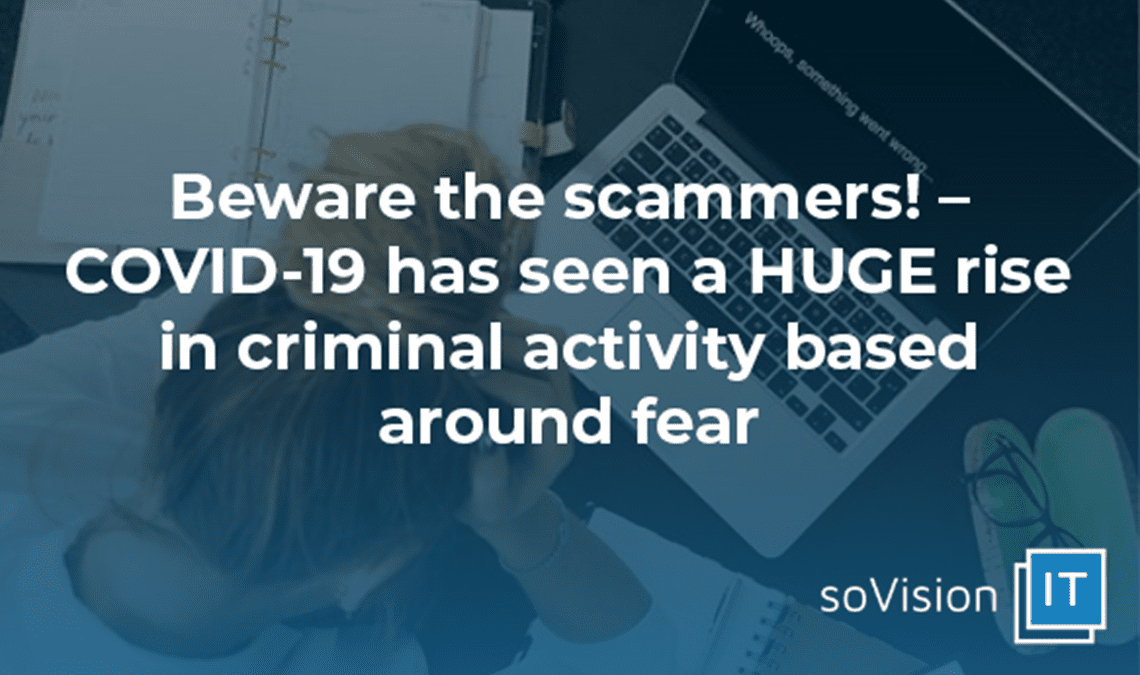Our Cyber Security Experts Are Asking You a Question
Have you noticed any emails or social media posts during lockdown which have made you pause or wonder – is that real? Is that true? Should I investigate this further? Yes? Then you need effective Cyber Security Services.
Please be very careful with any email or post which looks too good to be true, which you were not expecting or which makes the hairs on the back of your neck stand up. LISTEN TO YOUR GUT FEELING.
Our Bristol cyber security team are contacting every client warning them that COVID-19 has brought out the worst – as well as the best – of behaviours. It’s a ripe time for us to be scammed because of the strange situation which is sweeping the world.
Scammers and online con artists are masters at exploiting feelings of guilt, fear and an inbuilt need to help. Indeed the evidence shows that phishing emails alone had risen by over 600 per cent in March – goodness knows what the figures are now!
These scams follow particular patterns, they may be trying to get you to invest in a COVID-19 ‘cure’ which does not exist to steal your money, or they may be trying to capture your log-in details and financial information (or both) or they may be hooks to entice you to inadvertently download malware.
Our partner Barracuda Networks recorded 137 incidents around phishing scams in January this year, rising to 1,188 in February and then rising to a staggering 9,116 in March. These risks are continuously escalating, making Cyber Security Consulting Services even more crucial.
Here are just a few examples of ‘scams’ that our Cyber Security Services experts are aware of:
-
- The centre for disease control & Prevention asking for donations to develop a vaccine – donations through Bitcoin. The real organisation had nothing to do with this and the poor spelling and fluency was a big clue that this was a scam (reported by Kaspersky).
-
- Confidential cure solution for Corona Virus – the name Dr Gerrado appeared on the email and it was clear it was for gathering financial information. It went through to a spoof website and it’s estimated about 200,000 emails were sent out each time. Only a small number of people need to be fooled each time for the scammers to make a criminal financial killing (reported by Proofpoint)
-
- A convincing email apparently from gov.uk offering a COVID-19 tax rebate – with an ‘access your funds now button’ which led to a fake site for gathering financial data. There is no such tax rebate (reported by Mimecast).
-
- An email purporting to be from the World Health Organisation (WHO) asking you to click on an attached document for useful information about not spreading the virus. In reality, this is malware named AgentTesla Keylogger (reported by Proofpoint). Please note any communication claiming to be from the WHO should ring alarm bells, it’s often used by hackers and it’s best to go direct to the real WHO website for any information about its work or its advice around best practice.
-
- An invitation to download a coronavirus map – generally this is a way to download malware.
-
- An invitation to claim back holiday refunds – much like the so-called tax rebate – be very careful. Usually, this is a way to criminally capture your financial information.
How could they be scamming you?
These cyber criminals are not just operating via email. Scammers across the board are upping their activity across social media – selling fake goods claiming to cure the virus or protect you via supplements or ‘anti-virus kits’.
On the phone by claiming similar things, particularly if you are older or vulnerable – remember taking these calls often leads to more of the same. There’s a huge risk of being on a ‘suckers’ list’.
In person, scamming people on the doorstep by offering to do their shopping, taking the money and not being seen again.
All of us have to be vigilant to support our communities at this time from the opportunistic criminal.
At work, if you are concerned about your Cyber Security Services at a time when the risks could not be higher – please get in touch. We have the skills and the solutions to put your mind at rest – and the minds of your team who are working from home and maybe scared about inadvertently clicking on the wrong thing with very serious consequences for your business.
Please remember Coronavirus will change the way we all do business – are you ready?

